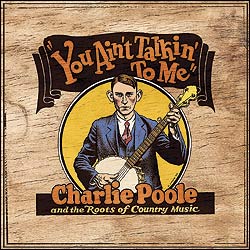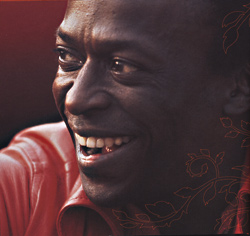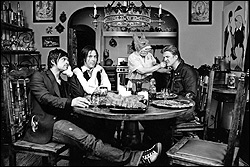In 1925, a hard-drinking North Carolina mill worker strolled into a New York studio with a banjo and a two-piece backing band to cut country music’s first smash hit, “Don’t Let Your Deal Go Down Blues.” Six years later, Charlie Poole was back at the mill, broke and miserable and nearly forgotten. And then, at the age of 39, he was dead, his career truncated yet not unproductive: Between the initial session and his last studio date in September 1930, Poole recorded 110 sides. Ninety-six remain extant, and the JSP label’s recent bargain-priced four-disc set, Charlie Poole With the North Carolina Ramblers and the Highlanders, serves up everything you need, and (definitely) more.
Everything, that is, except context, which is one thing Henry “Hank” Sapoznik has plenty to spare. The Sapoznik-shepherded three-disc extravaganza You Ain’t Talkin’ to Me: Charlie Poole and the Roots of Country Music (Columbia/Legacy) may be the Americana roots reclamation project of the year, but it’s hardly the first compilation to implicitly double as an essay in cultural history—place any two songs beside each other and, like it or not, you’ve advanced a thesis. Nor will students of box-set protocol be floored by Sapoznik’s basic agenda: to offer Poole’s distinctive banjo style (classical picking technique adapted for fingers he’d mangled in an attempt to barehand a baseball) as an integral, if early, element in the development of bluegrass. You don’t get a snazzy Columbia/Legacy project bankrolled without convincing somebody that your subject is more influential that previously acknowledged.
So far, so usual. Yet few, if any, ostensibly single-artist compilations have so ingeniously integrated other performers’ material to prove their point. The first disc of You Ain’t Talkin’ to Me is a standard introduction to Poole’s music, two dozen examples of his pristine picking and occasionally intelligible bleats of cottonmouth enthusiasm. (On first listen, I thought the character declaring “I’m gonna live on the highway till I die” actually planned to spend the remainder of his life in Iowa.) On discs two and three, though, Sapoznik gets fancy, sandwiching Poole tracks between versions by other musicians, establishing a context for the banjoist’s innovations. Sure, sometimes the process feels academic— the proper response to the Floyd City Ramblers’ lukewarm take on Poole’s “The Girl I Left in Sunny Tennessee” is, “Will this be on the exam?” But more often it grounds the music in a firm material past, populating the misty, inscrutable folkscape that cultural myth-mongers offer up with real live professional musicians who carefully listen to and learn from one another.
When it comes to tracing his subject’s precursors, Sapoznik is less concerned with isolating influences than with showing how radically Poole transformed his material. Hearing Poole’s elegant country waltz “I Once Loved a Sailor” follow its source material, Billy Murray’s Tin Pan Alley schmaltz “Come Take a Trip in My Airship,” allows us to recapture the jolt of surprise that history irons out of musical development. There are stylistic trade-offs as well—Poole’s loose-limbed claim on his signature tune, “You Ain’t Talkin’ to Me,” easily trumps Eddie Morton’s overripe 1909 take, yet something valuable is lost in exchanging the curlicues of the stately melody for rhythmic directness. And that’s not the only way the recording process was subtly streamlining American popular music—though Poole was performing with a second fiddle and a piano by his career’s end, Columbia firmly nixed any plans to record this expanded band.
As wide a range of material as Poole drew from, his biggest coup was to liberate the carefree energy that minstrelsy smothered beneath the ugly surface of ethnic stereotype. Though his love for the blues is singularly audible, many of the “coon songs” he bleached were, in fact, written and performed by white men, their dubious relation to prior strains of “black music” all but unchartable. Poole drastically (if incompletely) stripped away racist caricatures on cuts such as “Coon From Tennessee”—the title character, a shiftless object of mockery in the Georgia Crackers’ rendition, is a sympathetic laid-back outsider to Poole. To put the kindliest spin on it, a minstrel performer like Arthur Collins saw a song such as “Moving Day” as an amusing opportunity to inhabit a raw caricature. Poole, on the other hand, saw himself.
Charlie Poole’s music would be fascinating even if it had proven an evolutionary dead end. Whatever blueprint for the future you might discern on You Ain’t Talkin’ to Me is less gripping than its depiction of Poole’s particular, even peculiar response to his musical environment. And Sapoznik’s methodology doesn’t so much undermine our notion of genius as render it irrelevant. Here, mighty individuals do not invent new musical styles through sheer force of will; instead, songs bubble up from the public domain, are stamped by individual musicians in different ways, and disseminate as influences from there. Listening to You Ain’t Talkin’ to Me, you’re left with a sense that anything could have happened. And that sometimes it even did.








